Key takeaways:
- Burnout manifests through emotional detachment, persistent fatigue, and cognitive issues like lack of focus and irritability.
- Motivation in healthcare is essential for resilience and quality patient care, helping professionals navigate challenges through a supportive culture.
- Strategies to combat burnout include setting small goals, reframing challenges, and connecting with colleagues for support.
- Practicing self-care techniques such as mindfulness, physical activity, and seeking support can significantly improve well-being and long-term motivation.
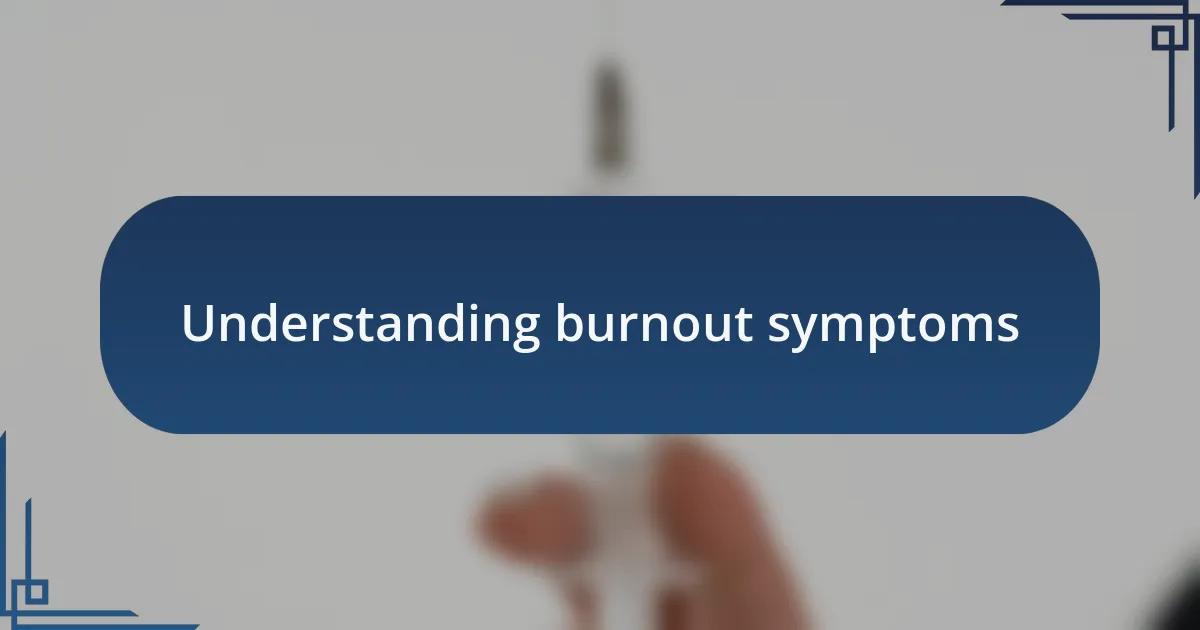
Understanding burnout symptoms
Burnout symptoms can be quite subtle at first, often creeping up on us when we least expect it. I remember feeling oddly detached from my work, as if I was merely going through the motions. Have you ever felt like that? It’s an unsettling experience, and recognizing that emotional disconnection is crucial to addressing burnout.
Physical symptoms can also rear their ugly heads during burnout. I once noticed persistent fatigue that a solid night’s sleep just wouldn’t fix. Have you experienced that kind of exhaustion where even your favorite activities feel draining? This relentless weariness is more than just being tired; it’s a clear signal from our bodies that something needs attention.
Cognitive signs of burnout can manifest as a lack of focus or increased irritability. I vividly recall the frustration of sitting at my desk, struggling to concentrate on a task that once seemed simple. Have you found yourself feeling overwhelmed by even the smallest challenges? These cognitive effects can often lead to a cycle of stress and anxiety, further deepening the experience of burnout if we don’t pay attention to them.
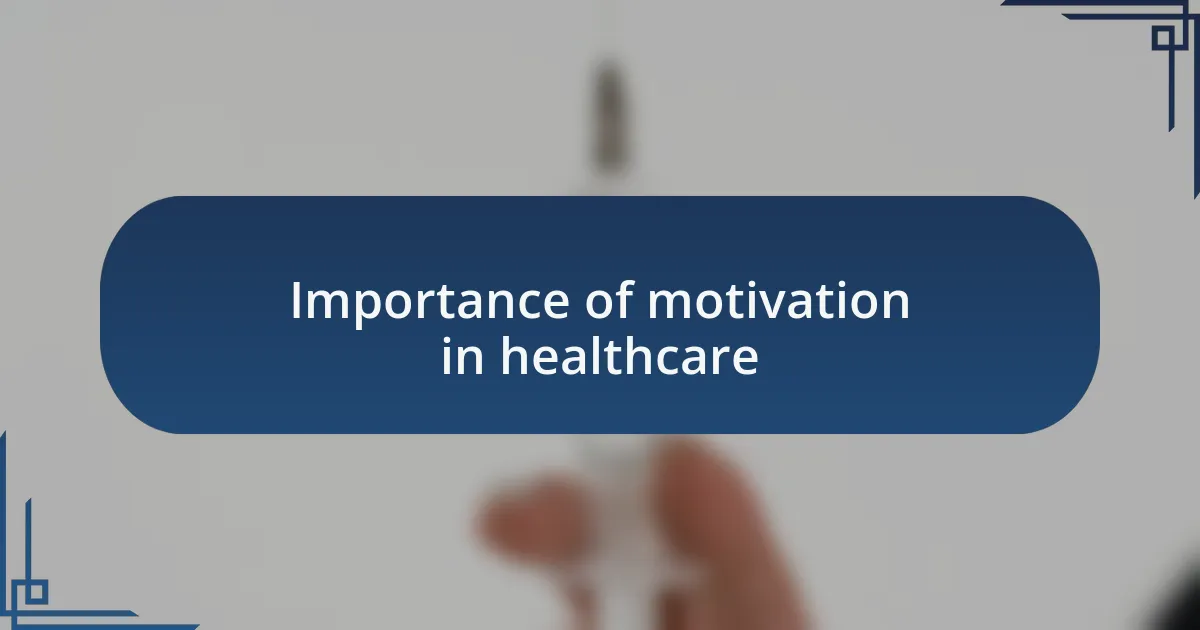
Importance of motivation in healthcare
Motivation in healthcare is not just a buzzword; it’s a vital force that drives professionals to provide the best care possible. I often think about my colleagues who dedicatedly show up to their shifts, even when they feel worn out. Their passion for patient welfare pushes them to go beyond the basic requirements, which can make all the difference in a patient’s journey to recovery. Does that same dedication resonate with you in your healthcare experiences?
This unwavering motivation fosters resilience and supports a positive workplace culture. I recall a time when my team faced a particularly overwhelming workload. We united, fueled by our shared commitment to our patients, and I truly believe that this motivation made it easier to navigate those challenging moments. Have you experienced that sense of camaraderie and purpose in a professional setting? It’s inspiring how motivation can transform stress into solidarity.
Moreover, motivated healthcare professionals often become advocates for change, looking to improve not only their own working conditions but also patient outcomes. I remember feeling invigorated when I led a small initiative to enhance patient engagement in our clinic. It wasn’t about the accolades; it was about making a genuine impact. How often do we overlook the power of motivation in sparking innovation in our field? Recognizing this importance can stir a change in how we approach our roles in healthcare.
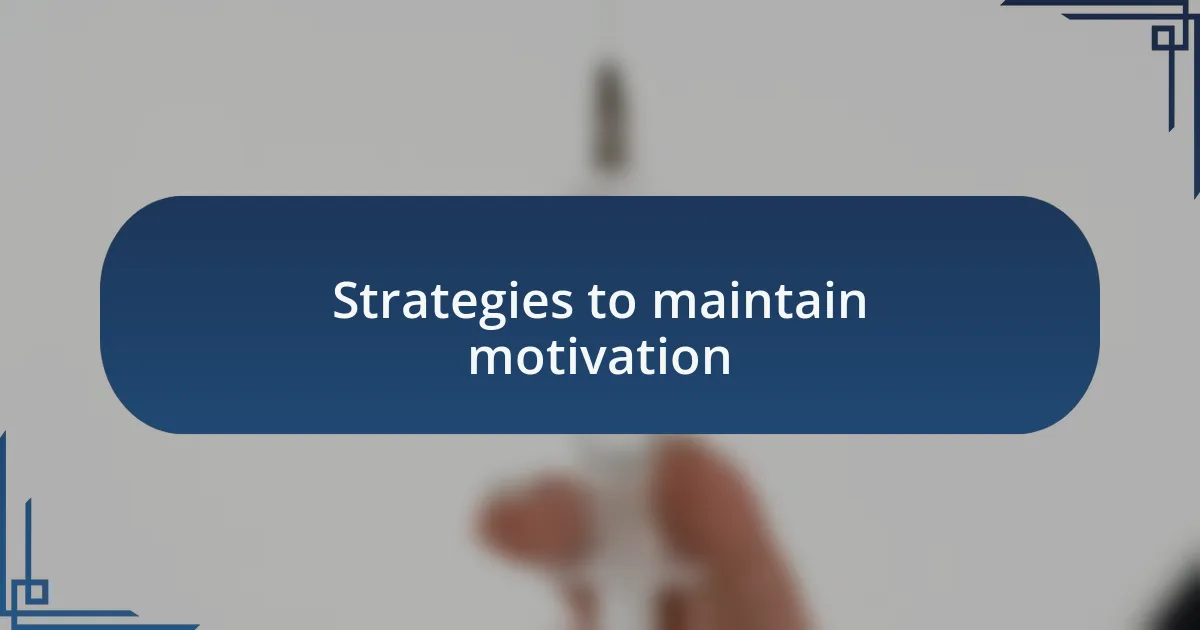
Strategies to maintain motivation
One effective strategy I find invaluable during burnout is setting small, achievable goals. When I feel overwhelmed, I break down my tasks into bite-sized pieces. Completing even a simple task, like organizing my desk or responding to a few emails, gives me a little boost of accomplishment. Have you ever noticed how small wins can create a ripple effect of motivation in your day?
Another approach I frequently use is to reframe my perspective on challenges. Instead of viewing them as obstacles, I try to see them as opportunities for growth. For instance, when faced with a particularly difficult patient case, I remind myself that each challenge strengthens my skills and adds to my experience. Isn’t it fascinating how a shift in mindset can significantly affect our motivation levels?
Lastly, I’ve learned the importance of connecting with others. Sharing experiences with colleagues can be incredibly uplifting. There have been times when a simple chat over coffee turned my entire day around. Have you ever reached out to a fellow healthcare worker just to vent? Those connections remind me that we are not alone in our struggles, and that support can reignite our passion for our work.
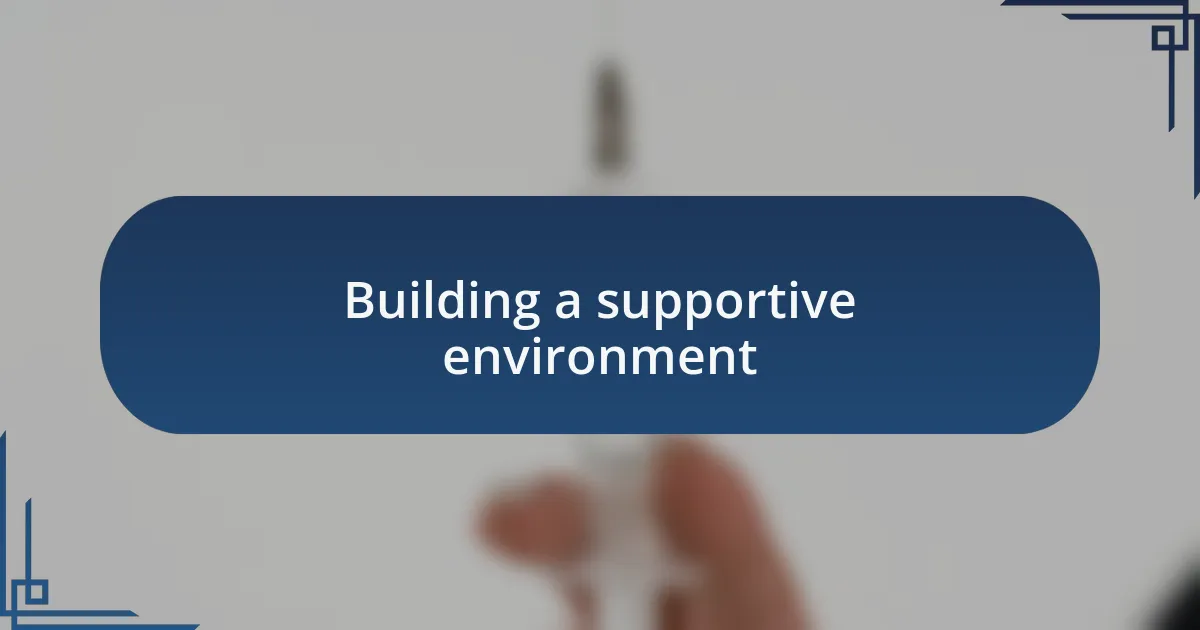
Building a supportive environment
Creating a supportive environment is essential in combating burnout. I’ve found that when I surround myself with encouraging colleagues, it can transform my outlook on even the hardest days. I remember a tough week when I felt completely drained; my team organized an informal lunch, and the camaraderie lifted my spirits significantly. Have you ever noticed how laughter and shared stories can make burdens feel lighter?
It’s also crucial to foster open communication within a supportive group. I value environments where sharing vulnerabilities is embraced rather than shunned. Once, I opened up about feeling overwhelmed, and to my surprise, several coworkers shared similar feelings. This candid exchange not only normalized my experience but also built a strong network of understanding and resilience. Don’t you think that vulnerability can be a bridge to deeper connections?
Moreover, finding mentors or allies who understand the exact pressures of healthcare can be incredibly beneficial. I recall meeting a seasoned nurse who not only listened to my concerns but also provided valuable insights on maintaining balance. Their guidance made me realize the importance of having someone in my corner who truly gets it. How often do we overlook the potential support around us, simply because we haven’t reached out?
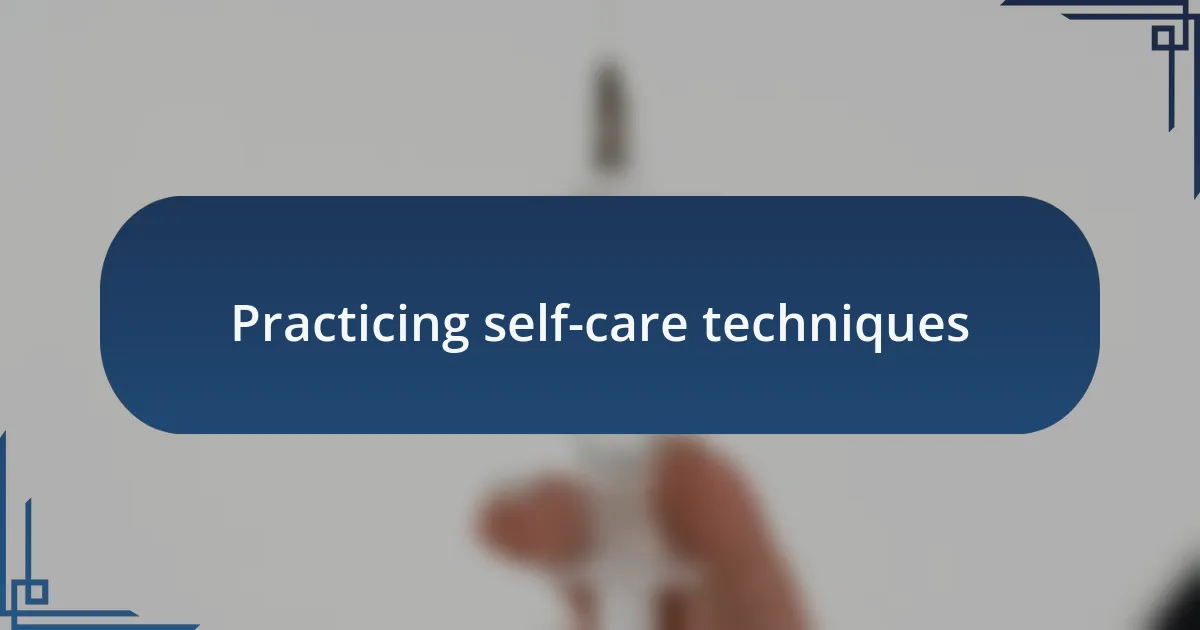
Practicing self-care techniques
Practicing self-care techniques is a crucial step in my journey to combat burnout. I often schedule time for activities that truly rejuvenate me, whether it’s a quiet walk in the park or indulging in a good book. I remember a particularly stressful period when I decided to set aside about thirty minutes each day just for myself. That small commitment made a significant difference in my mood by allowing me to recharge, even if just a little at a time.
Mindfulness has become an essential part of my self-care routine. Taking a few moments to focus on my breathing, or even practicing meditation, helped me ground myself in the present rather than getting lost in overwhelming thoughts. I once struggled with racing thoughts that made relaxation seem impossible, but by dedicating a few minutes daily to mindfulness, I felt a shift. Have you ever taken a moment to simply breathe and let everything else fade away? Those still moments can create a powerful reset.
In addition, I’ve learned the importance of physical activity in my self-care practices. Regular exercise, even a short workout or a dance session at home, releases endorphins that boost my mood. I experienced this firsthand during a challenging week; after a brisk jog, I felt lighter and more optimistic. Isn’t it fascinating how moving our bodies can directly influence our thoughts and feelings? Integrating small bursts of activity into my day has become a non-negotiable part of nurturing my well-being.
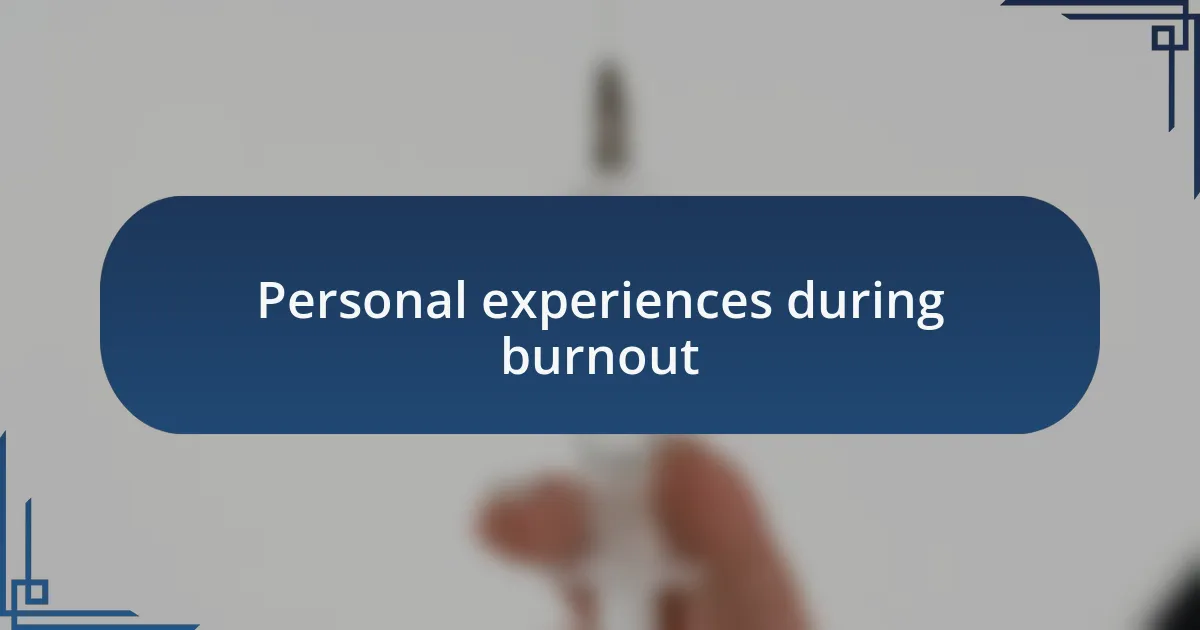
Personal experiences during burnout
During my journey through burnout, I’ve had moments that felt overwhelmingly heavy. I vividly recall a particular week when I felt like I was trudging through quicksand, where even simple tasks became monumental. In those times, it was easy to forget that I was human and not just a list of responsibilities. I had to consciously remind myself that it was okay to feel fatigued and that acknowledging those feelings was the first step toward recovery. Have you ever felt like you’ve lost your spark? That realization helped me embrace the situation rather than fight against it.
Another experience that stands out is when I attended a workshop focused on creative expression as a therapeutic outlet. I approached it with skepticism, thinking, “What can creating something really do for my burnout?” Yet, dedicating time to painting and simply allowing my thoughts to flow onto the canvas was transformative. I found that through the strokes of color, I could release pent-up emotions I hadn’t even recognized. Have you ever discovered a hidden part of yourself through an unexpected medium? It was a reminder that exploring new passions could reignite joy in ways I hadn’t anticipated.
There was also a time when I decided to reach out to friends for support during my lowest points. Initially, it felt daunting; I often wondered if my struggles would burden them. But every conversation left me feeling valued and understood. It highlighted how connection could serve as a powerful antidote to the isolation burnout often brings. Have you tried sharing your experience with someone close? I realized that opening up not only lightened my emotional load but also strengthened my relationships.
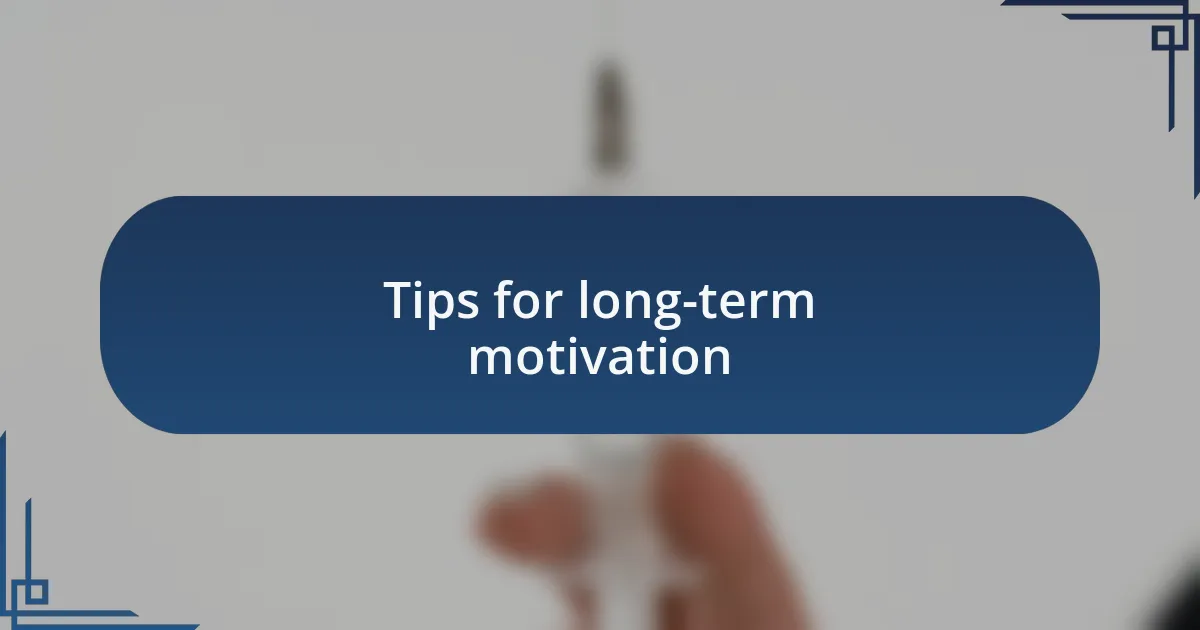
Tips for long-term motivation
Finding long-term motivation during burnout can sometimes feel like chasing shadows. One technique that has helped me is setting small, achievable goals. For instance, I remember when I was overwhelmed by the thought of a large project looming over me. Breaking it down into tiny steps not only made the task feel less daunting but also provided small wins that gradually reignited my motivation. Have you ever felt that sense of accomplishment from completing even the simplest tasks? Those little victories can create a positive snowball effect.
Another approach I swear by is creating a visual reminder of my “why.” I once crafted a vision board filled with images and quotes that resonate deeply with my personal and professional aspirations. Every time I glanced at it, I was reminded of what truly matters to me. This practice shifted my focus from the exhaustion of daily responsibilities to the excitement of long-term goals. Have you ever found clarity by visualizing your dreams? It’s a powerful exercise that can help reignite passion, even on the toughest days.
Lastly, I prioritize self-compassion as a key motivator. There were days when I felt frustrated with myself for not being as productive as I used to be. I learned to treat myself with the same kindness I would offer a friend, acknowledging that it’s okay to have ups and downs. On one particularly challenging week, I intentionally took breaks to rest without guilt. This not only rejuvenated my spirit but reminded me that my worth isn’t tied to my output. How do you practice kindness towards yourself? Embracing this mindset can be a game changer in sustaining long-term motivation.